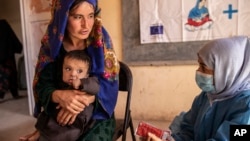Every morning since 2021, 26-year-old Sabira Saidi would wear her black hijab and face mask and go to work accompanied by her father or brother.
Saidi, who worked as a case worker for London-based Children in Crisis in Kabul and Maidan Wardak provinces, put up with all the restrictions imposed on women after the fall of Kabul into the hands of the Taliban to keep her job and support her family of 10.
But things changed for Saidi and thousands of women working with nongovernment organizations after the Taliban barred women from working with national and international NGOs on December 24 of last year.
The Taliban’s Ministry of Economy sent a letter to NGOs ordering them to suspend Afghan female employees “until further notice.”
In the letter, the Taliban said that the ban was imposed because female employees of NGOs were not wearing the hijab properly.
Saidi and other women working with NGOs, who spoke to VOA Afghanistan, say they abided by the Taliban’s dress codes.
They say the Taliban’s ban on women working in NGOs was part of the Taliban’s strategy to erase women from public space.
A few days before the NGO ban, the Taliban ordered universities to suspend female students’ access to the universities. The group had already banned girls’ secondary education.
After returning to power in August 2021, the Taliban steadily imposed some repressive measures against women, including banning them from secondary education, working in the government, traveling long distance without a close male relative and going to parks and gyms.
The U.N. special rapporteur on the situation of human rights in Afghanistan, Richard Bennett, in a report released February 9, considered these measures as an attempt to “erase women from all public spaces.”
The report added that “the cumulative effect of the Taliban’s systematic discrimination against women raises concerns about the commission of international crimes.”
Lost hope
Saidi said that now she spends all day at home, which has taken its toll on her.
“We suffer psychologically and financially,” she said.
Saidi said for now her organization pays her, but she is “not sure for how long it will continue.”
“My work as a case worker was to visit them [children] to see their lives from near and assess their living conditions. And then to see how we could provide them services,” said Saidi. “How can I do my job from home?”
She talks to her colleagues “daily to see if there is a change in the Taliban’s policies,” but “no one knows how long we will have to stay at home.”
“I lost my hopes,” said Saidi, adding that, “If I had my passport, I would not stay for a day in Afghanistan.”
Humanitarian crisis
Last month, the U.N. deputy special representative and humanitarian coordinator for Afghanistan, Ramiz Alakbarov, told journalists that 28 million people in the country depend on humanitarian aid for survival.
Since the Taliban’s return to power, “the gross domestic product [GDP] declined by up to 35 percent, the cost of a basic food basket rose by 30 percent and unemployment by 40 percent,” according to Alakbarov.
The Taliban’s restrictions have made it difficult for aid organization to work in Afghanistan, said Janti Soeripto, president and CEO of Save the Children, U.S. adding that the country is facing a humanitarian crisis.
“Operationally, it’s really impossible to do our work well and effectively without women. Women help us reach women and children in particular,” said Soeripto.
She said Save the Children has “made it clear” to the Taliban that “we will not work without our female colleagues,” adding the organization abided by the Taliban’s dress codes and female employees were accompanied by a “mahram,” a close male relative.
Save the Children has been in Afghanistan since 1976, working in 17 out of 34 provinces, with 5,000 employees in the country and half of them are women, according to Soeripto.
She added that among the 55,000 people working with NGOs in Afghanistan, one-third of them were women.
Soeripto told VOA that though her organization was able to start back its activities in the health and in the education sectors, they must get authorization not only at national but provincial level as well.
She said the Taliban gave them more assurances, but “we want to see actions not just the words.”
International pressure
Shinkai Karokhail, a former member of the Wolesi Jirga, the lower house of Afghanistan’s parliament, told VOA that the international community should increase pressure on the Taliban’s leaders.
“It should not be something that the people of Afghan pay the cost. ... It should be sanctions on those Taliban who are making decisions,” said Karokhail.
“But the world should not remain silent,” said a 27-year-old woman, who asked VOA to use the pseudonym “Arizo” for security reasons.
Arizo was the only breadwinner of her family and lost her job with an international NGO after the Taliban’s ban on women working with NGOs.
“The world should not recognize the Taliban as they have imposed restrictions on women and violated human rights,” she told VOA.
Arizo, Saidi and thousands of other women working with NGOs, now staying home after the Taliban ban, are worried about what the future holds for them.
Under the Taliban, “I see a bleak future for me and my family,” said Arizo.
This story originated in VOA’s Afghan service.





